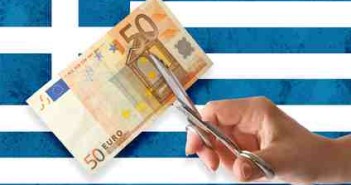Europe certainly remains in the limelight during Q1 2012. The Greek debt crisis began at the end of 2009 and has spread to other countries. Apart from countries, European banks are also on the edge. Nothing is secure and trust is hard to find.
How long can this leg dragging continue? Perhaps we will see some tougher decisions in Q1 2012. Here is the (basket) case of Greece
This analysis originally appeared in the Forex Outlook for Q1 2012. You can download the full report for free by joining the mailing list in the form below.
All the themes discussed in the Q4 outlook continue. Let’s review them:
- Austerity doesn’t work: Greece missed more budget targets and its economy continues to shrink at faster-than-expected paces. Unemployment is on the rise. Some blame the old and new governments in Athens that are incapable of delivering on their promises. Others say that the austerity imposed by the EU and the IMF was too harsh, and placed Greece in a spiral of lower growth, lower taxes, higher debt, more loans, more austerity, rinse, repeat. There is some truth to both sides of the story. Bottom line: if adjustments are needed each quarter, the program doesn’t work. All over again.
- Greeks are fed up: The installment of the Papademos government calmed down Greek protests a bit. But this new government with some old ministers is losing popularity fast as suffering continues. With every day that goes by with this coalition government, the trust in a political alternative is fading away.
- Global conditions continue deteriorating: It’s not only Greece and not only Europe. The entire world is slowing down and together with austerity, it kills hope of growth. It’s more of a depression than a recession in Greece.
- PSI Talks again: Talks were stuck in Q3, and are deeper in the mud now. With every day that passes, the 50% haircut target seems farther away from being enough, while banks are reluctant to make the “voluntary” move. Spanish hedge fund Vega already left talks. The parties are getting closer and falling apart over and over again.
- European leaders continue focusing on banks: France doesn’t want another Dexia and Germany doesn’t want to babysitter Commerzbank or any other banks. The only serious move in Q4 was the LTRO by the ECB, which helped the banks.
Looking again to the Q4 outlook, the leg dragging scenario won, and Greece indeed remained in the euro-zone. The chances for Greece to stay in the euro-zone during Q1 are dropping:
- It’s on the table: European leaders said it out loud during November. The Greek authorities are also discussing it out loud and warning that it can happen if PSI is not concluded and if reforms aren’t pushed through.
- Level of trust is lower: How many times can plans fail? Isn’t it time to let go? Despair is rising.
- Future advantages: Leaving the zone and adopting an old/new weak currency could help in the longer run.
Three out of four scenarios remain. The elegant orderly default option isn’t real anymore, given the lack of capacity of the EFSF.
- Non-elegant orderly default: PSI will eventually be approved this will be the long-awaited voluntary haircut. Together with massive support from the ECB, banks will be able to absorb the shock, Greece will stay in the euro-zone and European leaders will be able to celebrate success. The euro will strengthen in such a scenario, but these gains will be limited due to massive euro printing by the ECB and fear of a domino effect. The level of uncertainty will drop. This has some chances.
- More leg dragging: Another summit or three, followed by temporary aid to Greece from the IMF and a long troika visit will keep the country afloat for some more time, but without success in PSI and without hope for a change. In this case, the euro will continue moving lower, together with the economies. The level of uncertainty will remain high. This has equal chances to the previous scenario.
- Disorderly default: The chances are less slim than they were earlier. Markets move faster than politicians. Greece will leave or will be forced out of the euro-zone upon defaulting on its debt. This will cause chaos in Greece and in financial markets. Not all the pieces in the puzzle are known, with Credit Default Swaps being the most worrying part. ECB money can help, but in a limited manner in such a storm. The euro is still expected to survive, just with different members and a much lower value. In the long run, this scenario is good for Greece, the European economies and eventually for the euro, as it loses its weakest link.
But until things will get better, they will get much worse, and Greece will likely be only the first domino. The political will across the continent mean low chances for this scenario, but the chances certainly rose.
